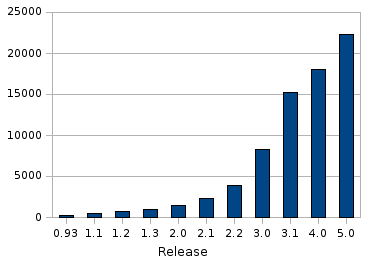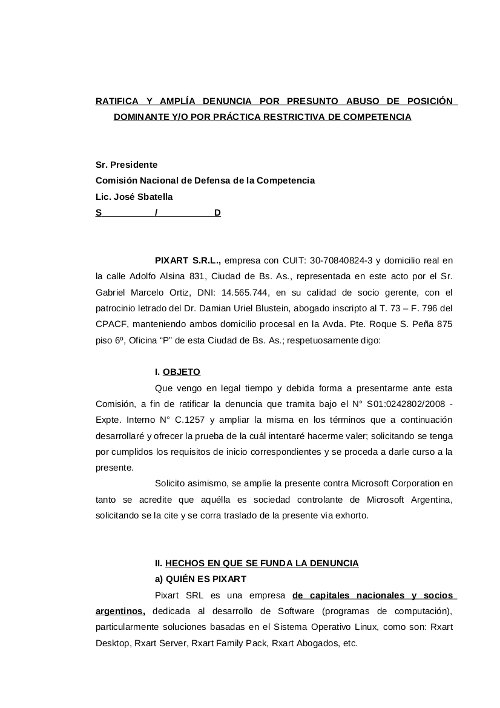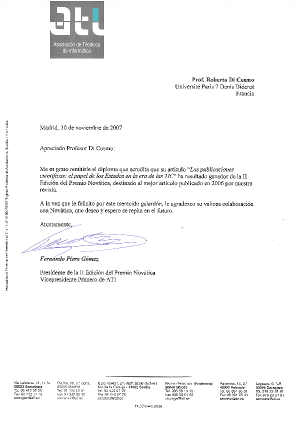While walking around in some corridors in Brussels, Paris and other capitals to explain why the state, which is different from a private company, must focus on Free Software, I had on many occasions the opportunity to cross officials encumbered by sincere fear.
They explained to me that some major players in the proprietary software industry (and it was not just Microsoft!) threatened to file suite against the for breach of competition law as soon as they showed some interest in Free Software.
The lobbyists argument went more or less like this:
"If you make a tender, or worse, if you write a law or directive requiring the use of Free Software, it prevents us from participating in these tenders with our proprietary software, so you violate the right of free competition because you exclude some of the software industry from your markets. We'll sue, and you will see what you will see! "
On each occasion, I tried to explain to this particular civil servant that this argument was completely hollow: there is violation of the competition when we exclude from a procurement a potential competitor on criteria other than technical needs real, not when a provider excludes itself by refusing to provide what is asked in the tender.
For example, we might attack for violations of rules on competition the innumerable public tenders poorly written that, instead of requesting an "integrated solution for email and calendar compliant with RFC822 and following standards, and able to exchange calendars in the published ICAL format" just mentions " 300 licenses for Microsoft Outlook "; misteriously, the lobbyists who roam the corridors have really nothing to say against these flagrant violations.
On the other side, if a government opened a tender for the construction of a building complying with (public) standards of high environmental quality, it is quite natural that manufacturers not knowing or not wanting to meet these standards are excluded: this is not an infringement of competition law.
Now, a government that takes seriously its obligation to ensure the sustainability of access to public data and confidentiality of personal data of its citizens, it must ask in its bidding that the software solutions provided are based on open standards and are made with free software: it is simply demanding software with the features necessary to accomplish its public service mission. If a software vendor can not or will not provide software with these characteristics, he is free to do so, but he can not pretend that there is a violation of competition law.
But this was, of course, just the opinion of an academic against that of heavy lobbyists.
A recent development of case law in Italy, that I just learned of thanks to Assoli, should finally help our dear frightened officials to fight back. Here are the key points.
- The Piedmont Regional Council had approved a law containing this language: "... The Region, in its choice of software, supports free software and software whose source code is verifiable by end users. » (article 6, alinéa 2) "(Article 6, paragraph 2)
- The Presidency of the Council of Ministers objected to this, asking the Constitutional Court to cancel a number of provisions.
- On March 23, 2010, the judgement is out, and among the rest, we note that the Court debunks the arguments by the Council of Ministers (argument which is, unmistakably, a copy of 'the argument propagated by the lobbyists).
"The concepts of free software and open source software are not concepts relating to a specific technology, brand or product, but express a legal feature ... (and) the choice (of this feature) belongs to the ... buyer of the software. It follows that ... there is no breach of competition (when giving advantage to Free Software in a regional guideline). "
I would like to thank deeply, in order, the Piedmont Region in Italy for having shown to be aware of the fundamental duties of a public administration in the era of digital technologies, the Italian Council of Ministers for having, by challenging this regional law, tested the validity of the specious arguments peddled by lobbyists of proprietary software, and the Italian Constitutional Court to have decided the issue clearly, in a language understandable even for the general public.
Now, let us forward this information to all the civil servants in our countries.



